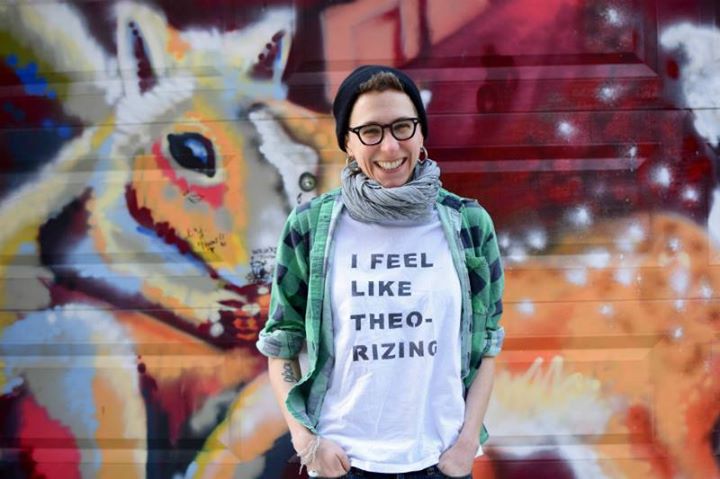An Interview with Sarah Pinder
By James Lindsay
“When you empty out your psychic pockets, how do all the disparate pieces relate to each other?”
I read Sarah Pinder’s most recent poetry collection, Common Place, while commuting from my home in northwest Toronto to my then job idowntown. I read a a few pages every morning and afternoon while squeezed in between people on buses and subways. I read it surrounded by strangers who where casually watching me read it. Written in brief segments that make up a larger thought that took its time to form, Common Place’s subject, living alongside others, mirrored where my mind was at the time and its carful pace matched my own routine—a daily exercise of considering a subject a little more each day, like someone taking an unrushed time to solve a Rubik’s Cube; who is not doing it out of competition, but to understand how it works.
James Lindsay:
When reading Common Place I kept getting the sensation that I was watching a series of civic relationships: people being in proximity with other people in an urban environment. As someone who lives in a major city, how do you view your relationship to the city and its citizens?
Sarah Pinder:
I spend a lot of time thinking about relationality – how are we with each other, alongside each other? Everything about moving through any space – but particularly this city – feels like a conversation, for me. I like that multiplicity and porousness a lot, but it can also feel overwhelming
JL:
Reading Common Place, often it seems to have an episodic quality to it—a larger moment broken down into smaller poems. What draws you to this form of writing?
SP:
This project took shape as a way to try to write through multiplicity, through a plurality of focuses, which felt like a truer articulation of my experience of moving through the world than the way I'd been writing with earlier, more discretely focused projects. I wrote the book in one extended sitting, in a page a day increments, in an attempt to think through a bunch of questions I had for myself about the shape and edges of value, desire, and longing and how those concepts relate to things like the state, and economics. I wanted to place the ideas I was working through alongside each other—it's the idea of conversation and connection (and disconnection!) that interests me. When you empty out your psychic pockets, how do all the disparate pieces relate to each other? What do they say when they speak together?
JL:
That you wrote the collection in an "extended sitting, in page a day increments" is fascinating to me. It reminds me of the Argentinean writer César Aira's style: writing for a set length of time every day with no revisions, what he calls "flight forward." When working on Common Place, did you look back at what you had previously written? Or were you more concerned about moving forward to answer your questions?
SP:
I didn't look back when I was writing it—I wanted to write the full document before I assessed or edited it. I decided how long I wanted the manuscript to be, then wrote to that page count—then went back and looked at the whole thing and edited it significantly, by myself, with the help of several friends, with my editor at Coach House, then again by myself. Filtering what felt like a very close and visceral initial text through several layers of intensive editing helped me to hone and shape the book, but I didn't move things around very much. The text appears in roughly the same order that it was written in - I cut sections and trimmed things a lot to turn the volume up or down on particular content, though.
Your CanLit News
Subscribe to Open Book’s newsletter to get local book events, literary content, writing tips, and more in your inbox
Writing and editing this book ended up feeling like working in an extended conversation—with myself, with my loved ones, with my communities, with visual art and music, with the landscapes I was moving through. For a long time, it felt like everything in my day-to-day life was in a feedback loop — working on a single thing that wasn't broken into discrete units for such a long time was a very new process to me, and felt very immersive.
JL:
Did the conversation change as you wrote? Did your perspective of your subjects (yourself, loved ones, community, art) change as the conversation progressed?
SP:
It felt like a transient text to write and edit in a lot of ways—conversations shifted from foreground to background to foreground again, connections sparked and fizzled, and my relationship to concepts and people shifted over and over throughout working on this. It became a text of a variety of threads, overlapping, knotting, loosening and disappearing.
Postcommodity (http://postcommodity.com), a collective of Indigenous artists out of the Southwestern US, performed a version of 'We Lost Half the Forest and the Rest Will Burn This Summer' in Guelph when I was working on this book, where they used found and hacked instruments to create a soundscape of the wildfires that tear through that region annually. It was a total wall of sound – it was incredible. Stumbling into seeing that performance by chance got me thinking a lot about regeneration, and continuation. What gets framed as final isn't always final - the questions of what happens after the so-called 'end' of a moment, a relationship or an image was a big one for me in working in this.
JL:
I loved that your process turned writing poetry into a kind of labour, a daily commitment. One quote that stuck with me the most: "I wanted to do some work each day, even if it was just holding the lid on the box a little longer." Did having this routine ever feel like a burden?
SP:
Having the routine of working on the same project every day, adding to it a little bit at a time, was something I both loved and at times felt frustrated with. It felt like the manuscript was a living, breathing creature that I had to keep feeding—a familiar, warm and soft entity that wanted to cuddle up, or someone insistantly pulling at my sleeve and stomping their feet until I figured out what they wanted.
My dad built a rock wall by hand. For a few years, this was something he worked on in this concentrated, daily way, picking the stones from the field he was clearing, piling and arranging them. That focused, long-game type of attention—where you start in with a general sense of the scope of the project you want to take on, but no idea about the middle beyond that you'll aggregate different materials, and figure out how they relate to and fit with the whole, felt resonant with me. And watching him build that wall was also an exercise in trust that it would come together. Picking rocks with him and adding them one at a time to the wall always felt a little Sisyphusian, but the wall is the full length of his field now, and waist high or higher. It came together, and came together in a way that both matched and departed from his original expectations.
The views expressed by Open Book columnists are those held by the authors and do not necessarily reflect the views of Open Book.
James Lindsay has been a bookseller for more than a decade. He is also co-owner of Pleasence Records in Toronto, a record label specializing in post-punk, odd-pop and avant-garde sound pieces.





